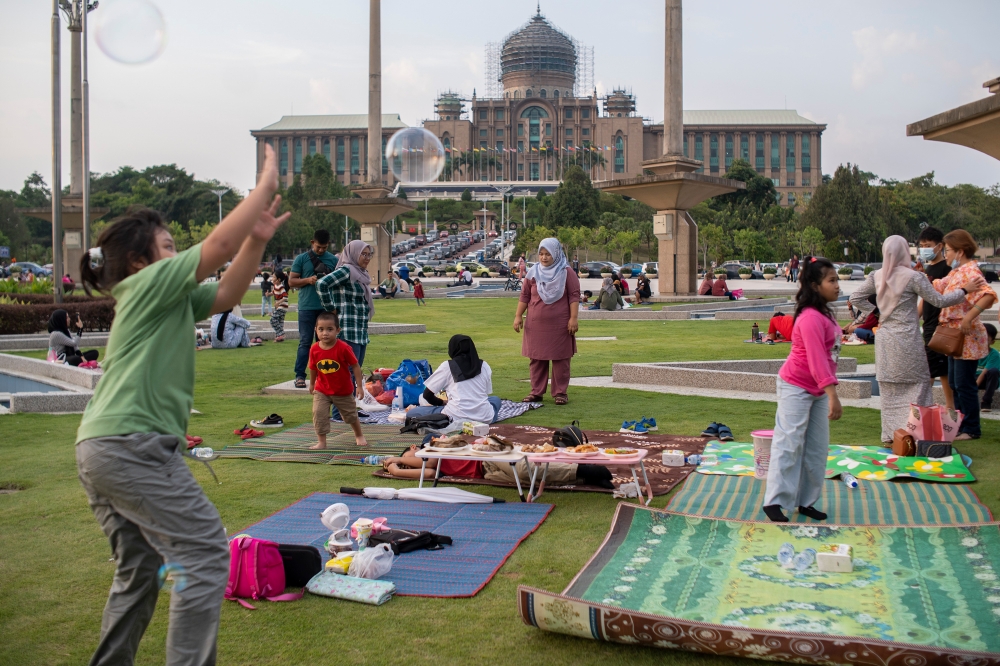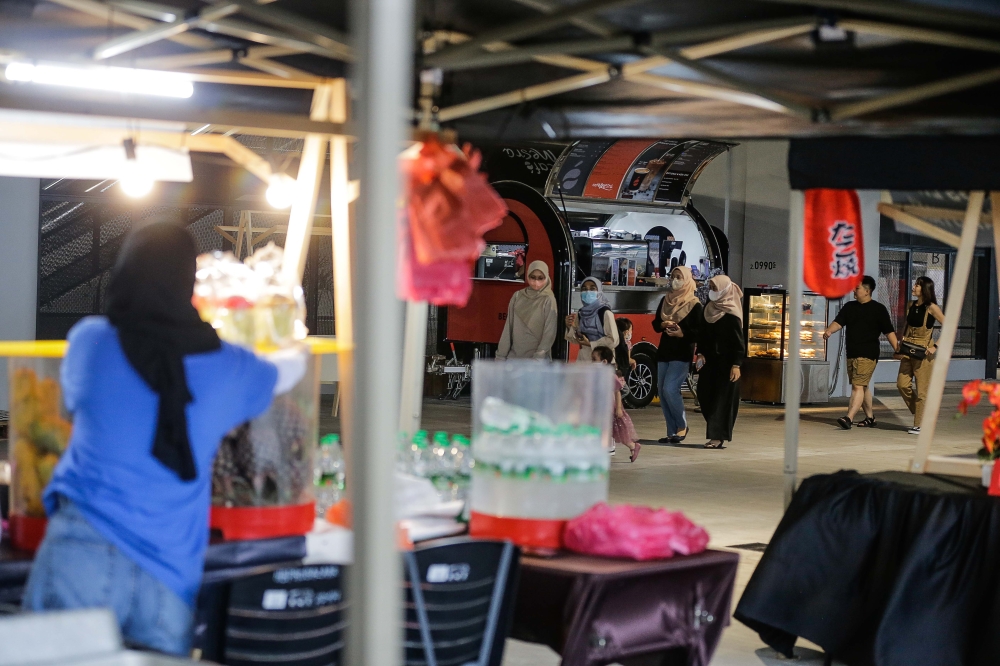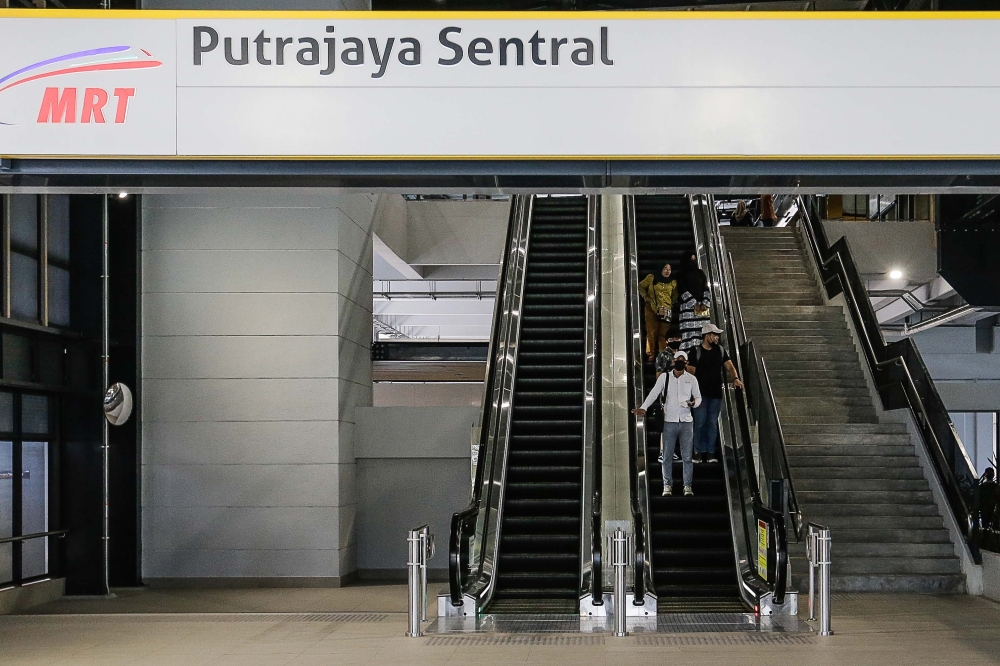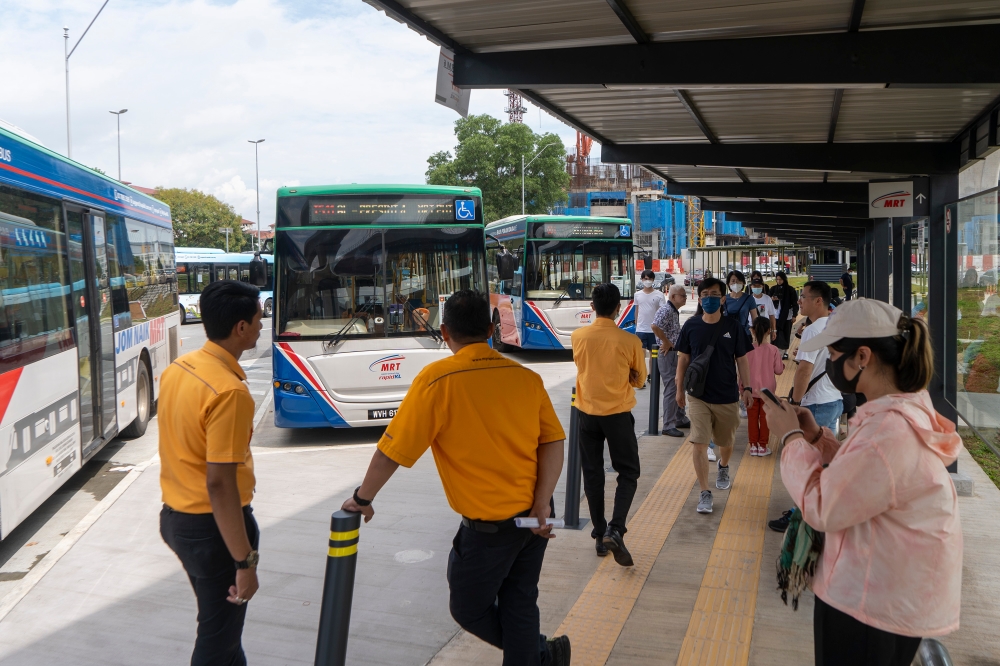MM:
Now with MRT access, Klang Valley visitors set foot in Putrajaya... some for the first time

The Phase Two of the MRT Putrajaya Line was finally opened to the public on March 16, 2023 after years of anticipation. — Picture by Miera Zulyana
Saturday, 15 Apr 2023 7:00 AM MYT
PUTRAJAYA, April 15 — Friends Amy and Grace took the MRT to Putrajaya all the way from Kepong last weekend with the former’s two children aged six and eight in tow, just so they could finally see what the federal administrative capital looks like.
When asked if this was the first time they arrived in Putrajaya — located over 40km south or nearly one-hour drive away from where they stay — the duo nodded.
“We came here from Jinjang station in Kepong, which is near our house. I brought along my friend and our kids here to see the area, since it’s the weekend,” the casually-dressed Amy told Malay Mail when met at the newly-opened Putrajaya Sentral MRT station.
“We don’t actually have any specific location to go because I don’t know the place, but I heard there’s a beautiful park somewhere in Putrajaya, so we might go there,” she replied, when asked where they had planned to visit in Putrajaya.
Another 36-year-old who took the MRT from Cheras and wanted to be known as Yee, also said that this was his first time here.
“We have malls in Cheras but we just wanted to see the IOI City Mall and we’ll be sightseeing the city along the way,” he said, referring to the country’s biggest mall situated in the IOI Resort City just outside Putrajaya’s north border.
“We can drive our car, but since there’s public transport heading straight to here, we can save a bit of money from paying fuel and tolls,” he added.

Saturday, 15 Apr 2023 7:00 AM MYT
PUTRAJAYA, April 15 — Friends Amy and Grace took the MRT to Putrajaya all the way from Kepong last weekend with the former’s two children aged six and eight in tow, just so they could finally see what the federal administrative capital looks like.
When asked if this was the first time they arrived in Putrajaya — located over 40km south or nearly one-hour drive away from where they stay — the duo nodded.
“We came here from Jinjang station in Kepong, which is near our house. I brought along my friend and our kids here to see the area, since it’s the weekend,” the casually-dressed Amy told Malay Mail when met at the newly-opened Putrajaya Sentral MRT station.
“We don’t actually have any specific location to go because I don’t know the place, but I heard there’s a beautiful park somewhere in Putrajaya, so we might go there,” she replied, when asked where they had planned to visit in Putrajaya.
Another 36-year-old who took the MRT from Cheras and wanted to be known as Yee, also said that this was his first time here.
“We have malls in Cheras but we just wanted to see the IOI City Mall and we’ll be sightseeing the city along the way,” he said, referring to the country’s biggest mall situated in the IOI Resort City just outside Putrajaya’s north border.
“We can drive our car, but since there’s public transport heading straight to here, we can save a bit of money from paying fuel and tolls,” he added.

Visitors to Putrajaya fill up their time while waiting to break fast during Ramadan in Dataran Putra at Precinct 1, with the Perdana Putra building in the background. — Picture by Shafwan Zaidon
Meanwhile, Lucassat Haransakee, 21, who came from Thailand with his mother and younger sister, said he had been aiming to see the resplendent Putra Mosque with its red dome in Precinct 1 ever since arriving in Malaysia two days earlier.
“My friend in Thailand said the Putra Mosque is a must-visit in Malaysia because of its beautiful design. I wanted to book a Grab ride all the way from Kuala Lumpur but my hotel told me I can take the MRT line from the Ampang Park station in KL to here as a cheaper option,” he said.
The second phase of the MRT Putrajaya line was launched on March 16 after years of anticipation, and just like Amy and Yee, some of those interviewed by Malay Mail admitted that they would not have set foot here if not for the new transit line.
MRT offers much cheaper entry
Despite being a federal administrative capital, few Malaysians — even those who stay in the neighbouring Klang Valley — have reasons to frequent the Federal Territory if they do not have any official government business or are visiting Putrajaya Hospital and Institut Kanser Negara.
The vast city could only be accessed and traversed comfortably with a car, and finding parking was challenging. The KLIA Transit Express Rail Link (ERL) was the only rail link into the city, costing up to RM14 for a roughly 20-minute trip from KL Sentral.
In comparison, the MRT line now costs roughly three times less at a maximum of RM5.40 per trip from the Muzium Negara station adjacent to KL Sentral for a roughly one-hour trip — which is a welcome relief to locals and outsiders alike.
It also serves several densely populated areas such as Kepong, Sentul, Kuchai Lama and Seri Kembangan, with many from those areas making the most out of the free trips offered in the two-week period last month.
During trips using the line last month, Malay Mail observed commuters during the weekends looking visibly excited that the line went through familiar areas with familiar sights for them. Many were groups of families who seemingly decided on a whim to take the line until its last stop: Putrajaya Sentral.
Once arriving, many just loitered at Putrajaya Sentral and the area connecting the MRT and ERL stations, where traders are allowed to set up food and drinks stalls but many have yet to take up the opportunity save for a coffee kiosk run by Petronas’ Mesra shop.

Meanwhile, Lucassat Haransakee, 21, who came from Thailand with his mother and younger sister, said he had been aiming to see the resplendent Putra Mosque with its red dome in Precinct 1 ever since arriving in Malaysia two days earlier.
“My friend in Thailand said the Putra Mosque is a must-visit in Malaysia because of its beautiful design. I wanted to book a Grab ride all the way from Kuala Lumpur but my hotel told me I can take the MRT line from the Ampang Park station in KL to here as a cheaper option,” he said.
The second phase of the MRT Putrajaya line was launched on March 16 after years of anticipation, and just like Amy and Yee, some of those interviewed by Malay Mail admitted that they would not have set foot here if not for the new transit line.
MRT offers much cheaper entry
Despite being a federal administrative capital, few Malaysians — even those who stay in the neighbouring Klang Valley — have reasons to frequent the Federal Territory if they do not have any official government business or are visiting Putrajaya Hospital and Institut Kanser Negara.
The vast city could only be accessed and traversed comfortably with a car, and finding parking was challenging. The KLIA Transit Express Rail Link (ERL) was the only rail link into the city, costing up to RM14 for a roughly 20-minute trip from KL Sentral.
In comparison, the MRT line now costs roughly three times less at a maximum of RM5.40 per trip from the Muzium Negara station adjacent to KL Sentral for a roughly one-hour trip — which is a welcome relief to locals and outsiders alike.
It also serves several densely populated areas such as Kepong, Sentul, Kuchai Lama and Seri Kembangan, with many from those areas making the most out of the free trips offered in the two-week period last month.
During trips using the line last month, Malay Mail observed commuters during the weekends looking visibly excited that the line went through familiar areas with familiar sights for them. Many were groups of families who seemingly decided on a whim to take the line until its last stop: Putrajaya Sentral.
Once arriving, many just loitered at Putrajaya Sentral and the area connecting the MRT and ERL stations, where traders are allowed to set up food and drinks stalls but many have yet to take up the opportunity save for a coffee kiosk run by Petronas’ Mesra shop.

A site where traders can open stalls is situated in the walkway between Putrajaya Sentral and the MRT station, but it is still relatively lifeless. — Picture by Sayuti Zainudin
While some would promptly take the train back to their homes, some took the opportunity to board buses and go sightseeing.
Raja Qhairy, 30, who worked at the MRT customer service counter, told Malay Mail that the station and Putrajaya Sentral were uncharacteristically crowded during the free ride period.
“We had thousands of passengers coming off here during that time. There’s always a long queue of visitors at the counters every day, from morning until closing hours, inquiring about the MRT2 or topping up their Touch ‘n Go card.
“They were here until the last train, which was around 11.36pm daily. We even had to reject passengers that came to the station as we had closed it,” he said.
Putrajaya Sentral in dire need of revamp
Now that the free rides period has concluded, Putrajaya Sentral was back to its quieter state with just work commuters and those who are changing lines to take the KLIA Transit line to the Kuala Lumpur International Airport (KLIA).
“There are more tourists during the free ride period compared to now. The station is busy nowadays only on weekdays, in the morning and evening when people are going to and from their workplace,” Raja Qhairy said.

While some would promptly take the train back to their homes, some took the opportunity to board buses and go sightseeing.
Raja Qhairy, 30, who worked at the MRT customer service counter, told Malay Mail that the station and Putrajaya Sentral were uncharacteristically crowded during the free ride period.
“We had thousands of passengers coming off here during that time. There’s always a long queue of visitors at the counters every day, from morning until closing hours, inquiring about the MRT2 or topping up their Touch ‘n Go card.
“They were here until the last train, which was around 11.36pm daily. We even had to reject passengers that came to the station as we had closed it,” he said.
Putrajaya Sentral in dire need of revamp
Now that the free rides period has concluded, Putrajaya Sentral was back to its quieter state with just work commuters and those who are changing lines to take the KLIA Transit line to the Kuala Lumpur International Airport (KLIA).
“There are more tourists during the free ride period compared to now. The station is busy nowadays only on weekdays, in the morning and evening when people are going to and from their workplace,” Raja Qhairy said.

The Putrajaya Sentral is an interchange between the MRT Putrajaya Line and the ERL's KLIA Ekspress and Transit lines. — Picture by Sayuti Zainudin
Universiti Sains Malaysia student, Shijia, 23, who had taken a flight from Penang and landed in KLIA that morning said she took the ERL from the airport, but changed to the MRT line in Putrajaya as the option is much cheaper.
“I want to go to KL for a short study break. I checked online that if you take the KLIA Transit train from the airport to here it is cheap, less than RM10. So I bought a ticket and am planning to take the MRT to go to KL,” she told Malay Mail.
A non-stop KLIA Ekspress ride from KLIA to KL Sentral can cost up to RM55 per trip. A combination of KLIA Transit and the MRT costs merely less than RM15.
However, tourists visiting Putrajaya for the first time using the MRT told Malay Mail that they would opt to use e-hailing services like Grab instead of taking the revamped Nadiputra bus service offered by RapidKL, which only costs RM1 per ride.
This is despite the existence of a free route, the P101, which serves popular tourists spots such as Dataran Putra where Putra Mosque and Perdana Putra are located, Taman Botani and Dataran Putrajaya, in front of the Palace of Justice.

Universiti Sains Malaysia student, Shijia, 23, who had taken a flight from Penang and landed in KLIA that morning said she took the ERL from the airport, but changed to the MRT line in Putrajaya as the option is much cheaper.
“I want to go to KL for a short study break. I checked online that if you take the KLIA Transit train from the airport to here it is cheap, less than RM10. So I bought a ticket and am planning to take the MRT to go to KL,” she told Malay Mail.
A non-stop KLIA Ekspress ride from KLIA to KL Sentral can cost up to RM55 per trip. A combination of KLIA Transit and the MRT costs merely less than RM15.
However, tourists visiting Putrajaya for the first time using the MRT told Malay Mail that they would opt to use e-hailing services like Grab instead of taking the revamped Nadiputra bus service offered by RapidKL, which only costs RM1 per ride.
This is despite the existence of a free route, the P101, which serves popular tourists spots such as Dataran Putra where Putra Mosque and Perdana Putra are located, Taman Botani and Dataran Putrajaya, in front of the Palace of Justice.

RapidKL offers MRT feeder services alongside the Nadiputra bus service serving Putrajaya, including the free P101 Route. — Picture by Shafwan Zaidon
With last-mile connectivity still under improvement, the main Putrajaya Sentral building remains a hollow shell of its previous self prior to the pandemic lockdowns and partial closure due to the MRT construction.
Most of the retail lots were either vacant or abandoned. One of its main tenants, the City Convenient Store, remains closed since the pandemic, with unsold snacks, drinks and other goods still on the shelves and switched off refrigerators — still untouched three years on.
Besides it, only a signboard remained of a previously popular stall, Luscious Pies, which arguably served the best slices in Putrajaya.
With the MRT construction complete, Putrajaya Sentral is currently marked for renovation, and a mixed development in between the station and the hospital complex holds promise for rejuvenation.
Overall, the MRT Putrajaya Line involves a 57.7km route from Kwasa Damansara to Putrajaya Sentral, with 36 stations including nine underground stations and 49 train sets.
On April 6, Transport Minister Anthony Loke said the number of the Putrajaya line passengers recorded during the first two weeks when operating for free was 100,000 per day.
Loke said his ministry was aiming for the Putrajaya line to be used by 200,000 passengers every day compared to about 80,000 at present.
With last-mile connectivity still under improvement, the main Putrajaya Sentral building remains a hollow shell of its previous self prior to the pandemic lockdowns and partial closure due to the MRT construction.
Most of the retail lots were either vacant or abandoned. One of its main tenants, the City Convenient Store, remains closed since the pandemic, with unsold snacks, drinks and other goods still on the shelves and switched off refrigerators — still untouched three years on.
Besides it, only a signboard remained of a previously popular stall, Luscious Pies, which arguably served the best slices in Putrajaya.
With the MRT construction complete, Putrajaya Sentral is currently marked for renovation, and a mixed development in between the station and the hospital complex holds promise for rejuvenation.
Overall, the MRT Putrajaya Line involves a 57.7km route from Kwasa Damansara to Putrajaya Sentral, with 36 stations including nine underground stations and 49 train sets.
On April 6, Transport Minister Anthony Loke said the number of the Putrajaya line passengers recorded during the first two weeks when operating for free was 100,000 per day.
Loke said his ministry was aiming for the Putrajaya line to be used by 200,000 passengers every day compared to about 80,000 at present.
Putrajaya has been notoriously inaccessible to people without access to their own car.
ReplyDeleteAnd once you are there, it can be a challenge to move around.
Really bad design for a capital, where sometimes people from other parts of the country had no choice but to go see an official in the Federal Ministry because the issue could not be resolved at the State Office level.